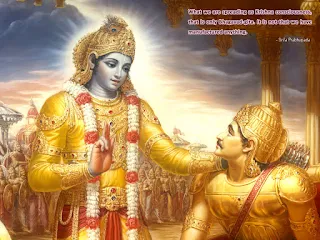 |
| Krishna demolishing Kansa |
Krishna's immediate duty was to defeat Kansa, his uncle, a demonic King. Trouble started when Kansa married off his sister, Devaki, to Vasudeva. Deep inside, Kansa intended to usurp Vasudeva's land. At the wedding, a prophecy was heard that Devaki's eighth child would be the reason for Kansa's defeat. Kansa imprisoned the couple, and Devaki's seven children were all killed at birth. Why all the other births, too, not just the eighth? Somebody alerted Kansa that the seven siblings could rally behind the eighth to attack him.
When the eighth child was finally born on an auspicious star on a wet rainy night, the hypnotic illusion of Vishnu came into full force. With sleeping guards and extremely lax security, a child was born, taken out of prison, transported across River Ganga, swapped with another baby, a baby girl, born at the same time, and returned to Devaki's cell. The baby girl cried only when it arrived at its destination, alerting the guards. The palace was alerted, but by the time Kansa laid his hands on the baby, he knew he had been duped. Was the prophecy wrong? The eighth born turned out to be a girl! Kansa tried to smash the baby on the wall. Surprise, surprise. The baby girl turned out to be Goddess Kaali, who announced that Kansa’s assassin was safe on the other side of the river and that his days were numbered.
Kansa spent the rest of his days thinking of Krishna, turning every corner and looking for his assailant. Long story short, Kansa sent so many adversaries to finish off young Krishna, but in vain. When Kansa was finally killed, it is said he attained moksha (released from the curse of rebirth) because Krishna was always on his mind, thinking of Krishna day and night.
 |
| Ravana |
Despite being the sorcerer and the erudite person he was, the fear of Rama and the accompanying Vanara army sank in. Ravana shuddered. What carnage could the rest do if one representative could do such damage? Every minute that followed, he was compelled to think of Rama and only Rama. Again, Ravana was defeated but also attained moksha because Rama was always at the tip of his tongue and immersed deep in his thoughts.
My feeble mind does not comprehend all these. These great tyrants, despite all their evil deeds, the pain and suffering they inflicted upon others, and the trail of destruction left behind, escaped the dreaded curse of reincarnation because they went on thinking and chanting the Lord's name. It is a rather lazy way of cutting the queue, surpassing all others who went the problematic way of collecting brownie points and spiralling through birth after birth to attain salvation. In my mind, katas (sermons) like these are the crossroads where itihasa (history), tattva (philosophy) and sciences morph into myths. The scriptures tell about Rama and Krishna's dates of birth indirectly through constellation positions, permitting accurate dating of certain events. This information can be fed through astronomical apps to verify the presence of such a constellation. Astronomical calculations had verified it to be correct. Their births probably happened. That is science. But I am not so sure about others. My blinkers are still on, and I may not be ready to receive the essence of the nectar of the Lord's divine wisdom. But I persevere...
(P.S. I had been under the impression that the law of karma works like Newton's Third Law of Motion. Every action has an equal and opposite reaction. You reap what you sow. Perhaps this escape route to erase one's sins is reactionary to what the Catholic Church was preaching at that time in India. A sincere confession under the name of the Lord cleans the slate. Fearing losing their congregation to the order side where something else is offered to the Law of Karma, the stakeholders may have relented. Instead of uttering ‘Hail Mary’ thrice and absolving your sins, they offered the chanting of ‘Hari Krishna Hari Rama’ indefinitely.)














